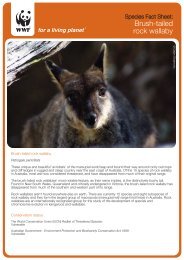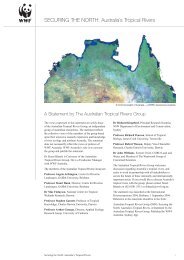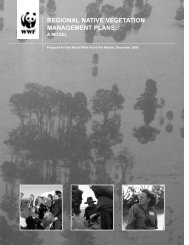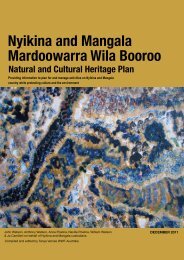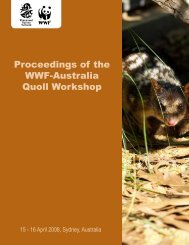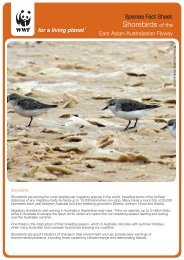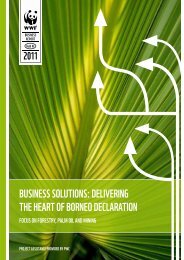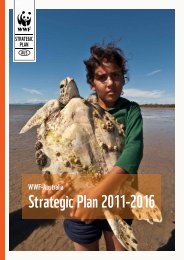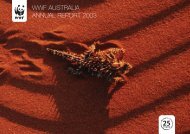Indigenous Peoples and Conservation Organizations
Indigenous Peoples and Conservation Organizations
Indigenous Peoples and Conservation Organizations
Create successful ePaper yourself
Turn your PDF publications into a flip-book with our unique Google optimized e-Paper software.
The Sirionó in Bolivia 83<br />
fied by the 36 traditional l<strong>and</strong>marks cited in the<br />
executive order.<br />
When the new legislation began its passage<br />
through the legislature, CIDDEBENI realized the<br />
opportunity <strong>and</strong> danger it posed. If the community<br />
could develop a plan to manage its forest<br />
resources, it would have the leverage to push forward<br />
<strong>and</strong> consolidate what the presidential decree<br />
had promised. If the community did not act, the<br />
new laws could be turned against the community<br />
<strong>and</strong> all that had been gained might be lost.<br />
To its credit, CIDDEBENI realized that for any<br />
victory to be lasting, the community would have<br />
to take charge. But it also knew that the community<br />
did not have the skills or the awareness yet<br />
to meet the challenge it faced. With preliminary<br />
financing from the International Work Group for<br />
<strong>Indigenous</strong> Affairs (IWGIA), a donor based in<br />
Denmark that supports training in self-governance,<br />
CIDDEBENI helped the community survey<br />
its needs, set priorities, <strong>and</strong> identify what had<br />
to be done to meet them. The Sirionó identified<br />
several areas for attention (CIDDEBENI 1996).<br />
The two at the top of the list—territory <strong>and</strong><br />
health—were to be expected, given the history of<br />
the past half-century. In descending order the<br />
remaining priorities were education, organization,<br />
cattle husb<strong>and</strong>ry, overuse of plants, lack of<br />
arable l<strong>and</strong>, overexploitation of wildlife, facilitation<br />
of honey production, commercialization of<br />
local products, <strong>and</strong> the need for outside work.<br />
Participants concerned with each priority were<br />
then asked to analyze its problems in detail.<br />
Those concerned with wildlife, for instance,<br />
reported that game was growing scarce in the<br />
traditional hunting grounds <strong>and</strong> hunters must<br />
travel farther from the community to find it.<br />
Possible reasons for this were outside poaching<br />
because the territorial guards were ineffective,<br />
<strong>and</strong> the absence of internal controls over the harvest.<br />
Analysis of plant overexploitation led to<br />
similar findings, <strong>and</strong> a list of threatened wood<br />
plants was drawn up. Participants noted that<br />
medicinal plants were also being lost, along with<br />
the knowledge of how to use them. Gradually<br />
the dialogues in these small focus groups moved<br />
to communitywide planning sessions at which<br />
conflicts <strong>and</strong> connections that were hidden<br />
became apparent. Thus awareness grew that<br />
people cutting dead trees for firewood were<br />
competing for a common resource with those<br />
hunting honey, since some native bees require<br />
hollow logs for their hives. This led people to<br />
think about the lack of forest resource management<br />
<strong>and</strong> administration not only for fallen but<br />
for st<strong>and</strong>ing trees.<br />
When the diagnostic survey was complete,<br />
IWGIA funded community development of a<br />
resource management plan <strong>and</strong> its partial implementation.<br />
Technical assistance to help the<br />
Sirionó h<strong>and</strong>le their 200 cattle is being funded by<br />
the Japanese donor JBN. But the core of the<br />
community effort is an integrated forest management<br />
plan with two primary components—for<br />
firewood cutting <strong>and</strong> honey production—<strong>and</strong><br />
research to add a third component for wildlife.<br />
CIDDEBENI, with IWGIA support, is teaching<br />
the Sirionó how to inventory their woodl<strong>and</strong>s <strong>and</strong><br />
develop rational schemes for firewood <strong>and</strong> honey<br />
production that can be presented to the Bolivian<br />
Superintendent of Forests as required by law.<br />
The driving force behind the forestry management<br />
plan has been the exploding firewood market.<br />
Outsiders constantly pressure the Sirionó to<br />
sell timber, especially what remains of the hardwoods,<br />
but many other trees are useful as fuel.<br />
Fortunately, since 1991 the community organization<br />
has been strong enough to legally repossess<br />
wood taken by pirate loggers. But the situation<br />
is complicated by the fact that individual Sirionó<br />
<strong>and</strong> the community organization have been making<br />
agreements with outsiders for selective tree<br />
cutting. Since 1992 the extraction of firewood<br />
from the territory has skyrocketed, with thous<strong>and</strong>s<br />
of cubic meters from agricultural clearing<br />
being sold to the ceramics industry in Trinidad<br />
alone. The integrated planning process is an<br />
attempt to bring order to a process that has been<br />
out of control.<br />
Following is an example of how seriously the<br />
Sirionó are taking this opportunity. In January<br />
1998, prior to approval of the management project,<br />
the Sirionó Council signed a contract with an outsider<br />
to cut wood to repay old community debts.<br />
The contractor agreed to pay Sirionó men to cut<br />
the wood with the community chainsaws, but only<br />
if the timber was priced cheaply. The contractor<br />
waited five months to call in his claim only to be<br />
greeted by an unwelcome surprise. Financing for<br />
the management project had finally been approved




